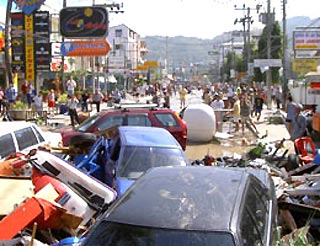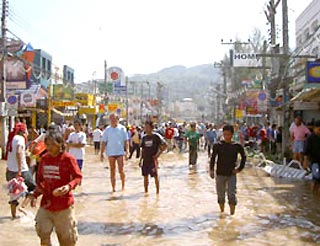2005 begins better than 2004 ended
Tsunami brings out the best and the worst of humankind
The new buzz-word of recent years, Tsunami, misunderstood by many as it crept into the vocabulary of the world's main languages, left no doubt as to its real significance in the last week of 2004. As the horror of the effects it unleashed upon countless thousands of victims from around the world came to be felt, so also were the reactions from the four corners of the Earth.
The fact that Russian rescue teams and supplies were rushed to the disaster area already on 27th December, when many countries were still wrangling about what to do, seems to have gone unnoticed in the international press, which is to be expected, given the climate of russophobia still endemic in western press circles hung-over not from Christmas and the New Year but mainly from the Cold War. The ongoing relief operations with experts deployed in the area, ferrying emergency aid to the victims on 28th and 29th December and thereafter also seems to have struck a blindspot in the international press circles which like to claim impartiality and objectiveness in their reporting, but which in fact practise a despotic policy of censorship unprecedented in the history of mankind.
However, the events of 26th December 2004 are not for scoring cheap political points, not are they for grand-staging because this monumental event, this tidal wave in international affairs, this tsunami among international relations, forged a benchmark among humankind, forcing all of us to ask the right questions and to try to find the right answers.
For example, why is it so relatively easy for countries such as the USA, the UK and their clique of followers and hangers-on, to spend hundreds of billions of dollars on a war in Iraq which saw the wholesale slaughter of tens of thousands of innocent civilians, when it appears relatively difficult to come up with a fraction of these figures in dollars-worth of humanitarian aid? And when less than a tenth of the war-fund is raised, mainly due to the efforts of private citizens, the collective government trumpets sound a brazen salvo of victory, does this make sense?
To commend are the efforts of the private sector in many countries, which have produced more than their governments initially pledged, when these private individuals, donating so generously, pay their taxes yearly, monthly and daily, to governments which are supposed to contribute automatically to funds for overseas development.
To commend are the considerable skills and courage of the aid workers in the countries affected. To commend are the selfless efforts of the inhabitants of Sri Lanka, Indonesia, the Andaman islands, Nicobar islands, India and Thailand, many of whom had lost family members but who insisted on ferrying tourists to airports or ports so that they could get home.
To commend are the hundreds of tourists who have refused to cancel their holidays just because they want to help the local inhabitants rebuild their lives and their economies. To commend are the heroic efforts of many family members of victims, who have flown to the resorts and offered their services in recovering the bodies of their loved ones, however difficult a task this may be.
To commend are the messages and initiatives of support from practically all the world leaders, although the international press likes to dissect and choose who apparently said what.
All world leaders without exception felt the same horror and revulsion as that expressed by the select few bandied about on the mainstream news agencies, such as the messages from Tony Blair on his “working holiday” in the Middle East and George Bush who sent his brother and the outgoing Secretary of State to East Asia, after nominating his father and Bill Clinton as the ongoing fundraisers for the Tsunami fund and days after the USA tried to set up an exclusive regional task force, soon to be abandoned in a hail of international criticism, provoking some nice cosy noises pointed in the direction of the UNO, an organisation and institution which the Bush regime stubbornly and pathologically insists on deriding.
However, even the Bush regime came out of this crisis as one with the intelligence to change its naturally arrogant track, set right what it innately put wrong and try to mend fences by working with mankind instead of against it. Colin Powell, the man famous for lying through his teeth at the United Nations Security Council, comes across today as a man seriously committed to leaving his mark on humanitarian affairs. Too late, but nevertheless a great parting shot.
Yet to speak of Bush and Powell and Blair and not to mention the thousands of messages of support, shock and horror and solidarity and help, aid and love expressed by the other world leaders, is to insult the collective intelligence of mankind. All world leaders are committed to doing what they can to stimulate their nations' aid efforts, just as all citizens of the world unite in a common humanitarian cause.
If 2004 ended catastrophically badly, 2005 has begun extremely well, with a new spirit of togetherness, a new and renewed spirit of urgency to set right what nature wronged, to leave our collective mark in an ongoing battle with the elements, against which we lose so constantly but strive to understand so consistently.
Perhaps the tsunami in south-east Asia on 26th December 2004 kick-started a new wave of togetherness, a spiritual globalisation of humanitarian values and concerns which belittles the petty-mindedness of regimes such as those of Bush and Blair and their sycophantic followers-on and speaks volumes about the real values coursing through the veins of humankind.
It is nice to begin 2005 by saying that in this humanitarian wave, we have Bush and Blair on board. Welcome to the international community.
Subscribe to Pravda.Ru Telegram channel, Facebook, RSS!





